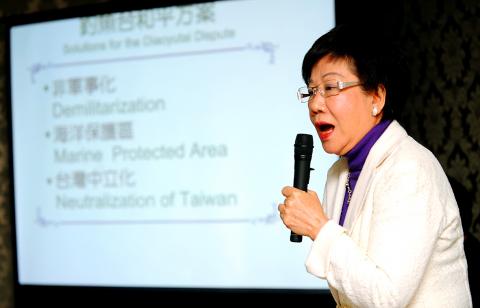Former vice president Annette Lu (呂秀蓮) yesterday proposed an initiative to demilitarize the disputed Diaoyutai Islands (釣魚台) and turn them into a protected marine zone.
At a press conference at her office in Taipei, Lu said that while Taiwan’s sovereignty of the islands — known in Japan as the Senkakus — is indisputable, the initiative advocates a three-step approach to resolve their status.
Taiwan, China and Japan all claim sovereignty over the islands, which are located in the East China Sea.

Photo: Lin Cheng-kung, Taipei Times
“I am here today to submit the Diaoyutais peace initiative, which calls for demilitarization of the region, designation of the region as a protected marine zone and the ultimate goal of the neutrality of the islands and Taiwan,” Lu said.
Lu said she was submitting the proposal, which was different from President Ma Ying-jeou’s (馬英九) East China Sea peace initiative, for the first time in Taiwan after raising it during a speech in December last year in the US and in Manila earlier this year.
Lu said both initiatives call for peace and setting aside sovereignty disputes. However, Ma’s tended to take a position similar to China’s, while she intended to shape territorial claims based on Taiwanese identity and history.
The proposal echoes the views of Academia Sinica research fellow Sung Yen-hui (宋燕輝), an expert on South China Sea affairs, who proposed making the region a no-fly, no-fishing and no-navigation zone and, contrary to Ma’s call for joint development, advocated the “joint non-development” of the area’s resources by all claimants, she said.
The initiative was formed in the same spirit as the Antarctic Treaty of 1959, the Ramsar Convention on Wetlands of 1971 and the Red Sea Marine Peace Park, established in 1994 to protect the ecosystem of the semi-enclosed Gulf of Aqaba, Lu added.
The former vice president said she was non-committal on Taiwanese fishermen’s attempts to reach the Diaoyutais to safeguard their fishing rights, adding that the matter should be resolved through diplomatic means.
“As the East China Sea and South China Sea issues are ‘touchstones’ of the US’ rebalancing policy in Asia, it is important for Taiwan to win US support if it wanted to fight a war over the Diaoyutais,” Tamkang University professor Wong Ming-hsien (翁明賢) said.
Taiwan would have to maintain good relations with Japan if it wanted to protect the fishing rights of Taiwanese fishermen and be very cautious in its approach to the dispute so that it’s moves would not be interpreted as collaboration with China, Wong added.
Wong said that recent approaches by the Ma administration to the dispute had been interpreted by Washington as cross-strait cooperation and added that discussions of sovereignty and fishing rights should be separated.
“Sovereignty could be the last thing on the fishermen’s minds, as they care most about their livelihoods, but when you talk about sovereignty, the question of ‘whose sovereignty’ — China’s or Taiwan’s — is inevitable,” Wong said.
Chuang Ching-ta (莊慶達), a professor at National Taiwan Ocean University, said APEC would be an ideal platform to present Lu’s proposals, which are in line with global trends.
Based on the geographical factor of the continental shelf, history and at least two Japanese court rulings during the 1940s, the Diaoyutais belong to Taiwan, said Lee Chao-shing (李昭興), a professor of applied geosciences at National Taiwan Ocean University.

Taiwanese can file complaints with the Tourism Administration to report travel agencies if their activities caused termination of a person’s citizenship, Mainland Affairs Council Minister Chiu Chui-cheng (邱垂正) said yesterday, after a podcaster highlighted a case in which a person’s citizenship was canceled for receiving a single-use Chinese passport to enter Russia. The council is aware of incidents in which people who signed up through Chinese travel agencies for tours of Russia were told they could obtain Russian visas and fast-track border clearance, Chiu told reporters on the sidelines of an event in Taipei. However, the travel agencies actually applied

New measures aimed at making Taiwan more attractive to foreign professionals came into effect this month, the National Development Council said yesterday. Among the changes, international students at Taiwanese universities would be able to work in Taiwan without a work permit in the two years after they graduate, explainer materials provided by the council said. In addition, foreign nationals who graduated from one of the world’s top 200 universities within the past five years can also apply for a two-year open work permit. Previously, those graduates would have needed to apply for a work permit using point-based criteria or have a Taiwanese company

The Shilin District Prosecutors’ Office yesterday indicted two Taiwanese and issued a wanted notice for Pete Liu (劉作虎), founder of Shenzhen-based smartphone manufacturer OnePlus Technology Co (萬普拉斯科技), for allegedly contravening the Act Governing Relations Between the People of the Taiwan Area and the Mainland Area (臺灣地區與大陸地區人民關係條例) by poaching 70 engineers in Taiwan. Liu allegedly traveled to Taiwan at the end of 2014 and met with a Taiwanese man surnamed Lin (林) to discuss establishing a mobile software research and development (R&D) team in Taiwan, prosecutors said. Without approval from the government, Lin, following Liu’s instructions, recruited more than 70 software

Taiwanese singer Jay Chou (周杰倫) plans to take to the courts of the Australian Open for the first time as a competitor in the high-stakes 1 Point Slam. The Australian Open yesterday afternoon announced the news on its official Instagram account, welcoming Chou — who celebrates his 47th birthday on Sunday — to the star-studded lineup of the tournament’s signature warm-up event. “From being the King of Mandarin Pop filling stadiums with his music to being Kato from The Green Hornet and now shifting focus to being a dedicated tennis player — welcome @jaychou to the 1 Point Slam and #AusOpen,” the